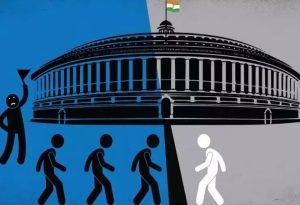16 Sep The pressing need to strengthen Anti-Defection Law
The pressing need to strengthen Anti Defection Law
The topic is based on the Indian Constitution. The article talks about how the strength of Anti Defection Law impacts the Indian Polity and Governance- Constitution.
Context
The recent incidence of 8 Congress MLAs switching to BJP has again brought to the limelight the blatant violation of anti-defection law in India. A similar incidence of floor crossing by legislators was earlier witnessed in Maharashtra when factions broke out within the Shiv Sena.
What is the Anti-Defection Law?
The 10th Schedule, commonly known as Anti-Defection law, was inserted in the Constitution by the 52nd Constitutional Amendment Act, 1985. It was brought into force to curb the frequent defections by MPs and MLAs. This trend was so frequent that it gave rise to the infamous phrase ‘‘Aaya Ram Gaya Ram’ as in 1967, a Haryana MLA changed his party allegiance thrice in a fortnight. Anti-Defection law contains provisions for the disqualification of elected members by the Presiding Officer on the grounds of defection to another political party.

Anti-Defection Law
Issues
- The exception of “merger”: The 10th schedule provides for an exception to the application of the law in the form of mergers. It states that where 2/3rd members of a political party leave that party to merge with another political party, then the provisions of anti-defection will not apply. Though the intention behind adding this exception was to allow dissent, this loophole is often exploited by MPs and MLAs to switch to other parties and leads to bulk defections
- Failure to penalize Political Parties for accepting defecting legislators: The law fails to punish or penalize the Political Parties which encourage and facilitate the defection of elected representatives and accepts them in their party. This gives rise to a culture of acceptance of defection in the country.
- The wide discretionary power of the Speaker: Since the law does not provide a time period within which the presiding officer has to decide a defection case, many times, the Speaker simply does not take any action on cases of defection and waits for the term of the assembly to come to an end. Hence, the defecting legislators are not disqualified.
- Article 164(1B) of the Constitution: Though it stops the members of the house disqualified due to defection from becoming ministers, it doesn’t prevent them from re-contesting election thereby defeating the spirit of the law.
What does the Apex Court say?
- The Supreme Court in Kihoto Hollohan vs Zachillhu(1992) upheld the validity of the law and also held that the Speaker’s decision was subject to Judicial Review.
- In the case of Keisham Meghachandra Singh vs Hon’ble Speaker 2020, the Supreme Court held that though the Constitution doesn’t give a timeframe, a Speaker cannot indefinitely sit on the petition of disqualification on grounds of defection. The Court noted that while the Constitution or any other statute does not prescribe a strict time period, a Speaker cannot sit on a disqualification petition indefinitely. Such a petition has to be decided within a reasonable time which would mean within a period of 4 months.
What should be done to strengthen the Anti-defection law?
- The Law Commission in its 170th Report suggested deleting the exception of merger given in the 10th Schedule.
- The National Commission to review the working of the constitution (NCRWC) has recommended that the power to disqualify a member should be exercised by the President (in case of MPs) or the Governor (in case of MLAs) on the advice of the Election Commission.
- Promote intra-party democracy so that elected members can voice their opinions and concerns about the working of the party and resolve issues within the party in a harmonious manner.
Way Forward
There is a need to re-look at the provisions of anti-defection law and make it stronger. The Members of Parliament and Legislatures are the elected representatives. Changing political parties is a fraud on the mandate of the citizens. Redefining the merger clause and shifting the adjudicatory power from the Speaker to some other credible authority is absolutely needed. The vibrant democratic values enshrined in the constitution should reflect in our Political system.
Sources
Download PDF Now:
Plutus IAS current affairs eng med 16th Sep 2022
IAS Current Affairs: Get updated and the best daily current affairs from the UPSC examination from Plutus IAS to increase your general knowledge. So collect and read daily current affairs from our site.
Please also go through weekly and monthly current affairs for IAS exam preparation from the Plutus IAS website.




No Comments